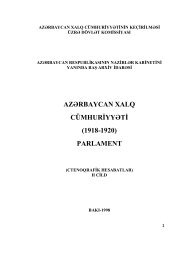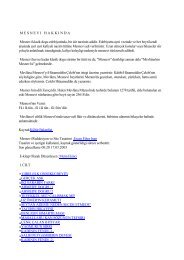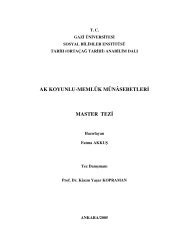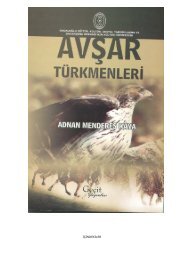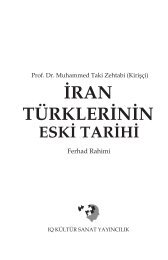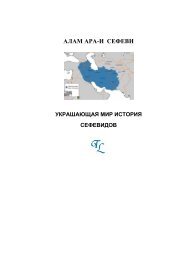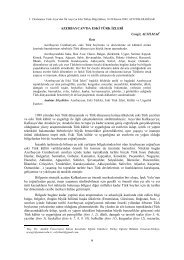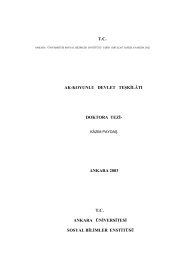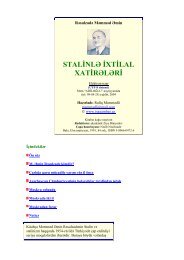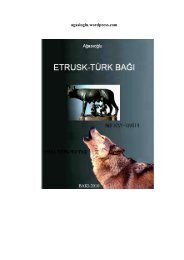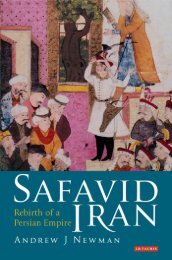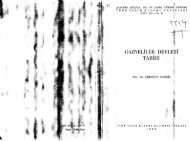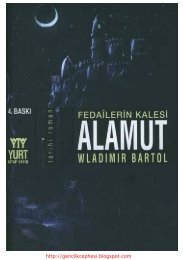War and Peace in Qajar Persia: Implications Past and ... - Oguzlar.az
War and Peace in Qajar Persia: Implications Past and ... - Oguzlar.az
War and Peace in Qajar Persia: Implications Past and ... - Oguzlar.az
- No tags were found...
You also want an ePaper? Increase the reach of your titles
YUMPU automatically turns print PDFs into web optimized ePapers that Google loves.
186 Ali GheissariFurthermore, “as of late, which is the Dhul-Hijja of 1329 ah [Novemberor December 1911], from Rasht [the Russians] have brought <strong>in</strong> manytroops, [they] have sent some to Q<strong>az</strong>v<strong>in</strong>, <strong>and</strong> have kept some here [<strong>in</strong>Tabriz] – it is for two weeks now that the b<strong>az</strong>aar has been closed <strong>and</strong>people are confused. ...Out of desperation <strong>and</strong> <strong>in</strong> disarray I have beenstuck <strong>in</strong> the house...<strong>and</strong> once more I thought that too much worry wouldharm me, so I kept myself busy aga<strong>in</strong> with the writ<strong>in</strong>g of this history.” 16Although Hajj Mohammad-Taqi wrote under stress <strong>and</strong> anxiety, the text ofthe Memoirs has a certa<strong>in</strong> flow <strong>and</strong> ease <strong>in</strong> style. At times it reflects the author’sambivalence regard<strong>in</strong>g political events or over bus<strong>in</strong>ess issues <strong>and</strong> decisions,but it also shows that he rema<strong>in</strong>ed on solid ground with respect to mattersof faith, commitment to trade, <strong>and</strong> the sense of duty towards himself <strong>and</strong> hisfamily. All distractions <strong>and</strong> occasional doubts notwithst<strong>and</strong><strong>in</strong>g, <strong>in</strong> his m<strong>in</strong>dhe was sufficiently organized to devote at the outset a good deal of space tocommon statements of faith <strong>and</strong> creed <strong>and</strong> a number of popular faith-basedobservations on the actual <strong>and</strong> potential capacity of the human m<strong>in</strong>d to graspDiv<strong>in</strong>e knowledge; deduc<strong>in</strong>g from them a k<strong>in</strong>d of moral theory of knowledge.Accord<strong>in</strong>gly, although human m<strong>in</strong>d is limited <strong>in</strong> atta<strong>in</strong><strong>in</strong>g full knowledge ofreality, moral imperatives as directed by faith keep man on the right path –a deduction through which the author also arrives at a teleological certitude<strong>and</strong> functional, rather than meditative, view on the mean<strong>in</strong>g of be<strong>in</strong>g. Hefurther discussed the family as a necessary <strong>in</strong>stitution, the significance of procreation,<strong>and</strong> the special status of parents <strong>and</strong> one’s duties towards them. Severalpages are devoted to various aspects of such theological <strong>and</strong> moral po<strong>in</strong>ts,written <strong>in</strong> the spirit of faith <strong>and</strong> practical devotion. 17 Hajj Mohammad-Taqistated that <strong>in</strong> appreciation to Div<strong>in</strong>e attributes there are centres <strong>and</strong> peripheries,<strong>and</strong> also there is a hierarchy which encompasses animate <strong>and</strong> <strong>in</strong>animateworlds; hence, he observes great difference <strong>and</strong> diversity with<strong>in</strong> each categoryof be<strong>in</strong>g – both <strong>in</strong> terms of quality <strong>and</strong> <strong>in</strong> form. Accord<strong>in</strong>gly, we do not fullyknow the details <strong>and</strong> specifics of such differences, but certa<strong>in</strong>ly there mustbe a hierarchical ladder – for <strong>in</strong>stance, among stones, which differentiatesgems from ord<strong>in</strong>ary rocks. The same hierarchy also applies to the world ofhumans – no matter how much man prays, or submits to the Will of God,he will not be equal to a prophet who was directly appo<strong>in</strong>ted by God. 18 Theconclusion of his argument is that God’s purpose <strong>in</strong> creat<strong>in</strong>g man was forman to cont<strong>in</strong>uously strive to know God.Hajj Mohammad-Taqi then embarks on summariz<strong>in</strong>g the biblical narrativeon the genealogy of the human race, <strong>and</strong> goes on to specifically highlightits moral significance. From Adam <strong>and</strong> Eve, Abel <strong>and</strong> Ca<strong>in</strong> were born.After Ca<strong>in</strong> slew Abel, chaos prevailed. In response to Adam’s mourn<strong>in</strong>g forAbel, God created Sheith (Shem) <strong>and</strong> Yafeth (Japheth), <strong>and</strong> designated aHouri for Sheith to marry, <strong>and</strong> a J<strong>in</strong>n for Yafeth – who, respectively, representedgood <strong>and</strong> bad attributes <strong>in</strong> the moral make-up of humanity. Subsequently,the human race proliferated <strong>and</strong> settled <strong>in</strong> different parts of the earth



